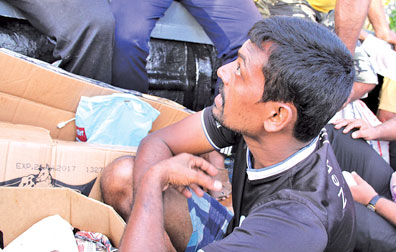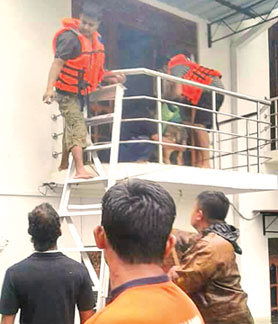|
Three-wheeler drivers' network:
Bridge between rescuers and victims
by Ranil Wijayapala
Sri Lankans have always shown their strength and goodwill when faced
with disasters. Very few nations react with such generosity and altruism
as Sri Lankans do, when their countrymen are in need of help. It is this
unique quality that helped many stranded people during the recent floods
that played havoc in the country. When the country's capital city almost
came to a standstill, as nature unleashed her wrath, volunteers
organised themselves to help the victims throughout the country.
In the Colombo district, many stepped in to help the flood affected
people and created their own communication network. They passed messages
and information about people marooned in the floods and those
inaccessible to the relief operators and rescuers.
One group, i.e, the three wheelerer-drivers were especially helpful
in the search and rescue operations. They are usually known for their
notorious disregard for road rules and short cuts, but in times of
crises they are the best resource persons to direct the rescuers the way
to reach victims.
Typically, three- wheel drivers are self appointed masters of the
neighbourhood road networks, and this came in handy when rescuers wanted
to access people stranded in their homes. They became the bridge between
the relief operators and the marooned people by providing the required
communication to the rescue teams from the Armed Forces and other
volunteer organisations who arrived to help, and who had no clues on the
whereabouts.
According to a navy officer in-charge of rescue operations in
Wellampitiya, who wished to remain anonymous, the teams engaged in
rescue operations had little idea about the roads in the area as they
navigated boats along the flooded, narrow roads.
"Despite having all the gear with us to rescue the people, we were
initially not familiar with access points to reach the people. We didn't
know whether the areas where the victims lived were accessible by boats.
Most of the byroads in Wellampitiya area are narrow roads with parapet
walls, concrete pillars, dangerous iron rods and iron fences, submerged
in water. We needed the assistance of people familiar with the landscape
of the area. The three wheeler drivers came forward to guide us," the
navy officer said, commending the service extended by the three wheeler
drivers.
 |
|
Heroshan Thilak Kumara |
Many who had the telephone numbers of the three-wheel drivers and who
could not move out of their flooded houses, passed the message to them
hoping it would be conveyed to the relevant parties. Subsequently, this
method became an effective communication network for the relief
operators.
Dushantha Uditha Sanjeewa from Kittampahuwa who ran hires in the
Wellampitiya area was one such person who became a contact point for
many in his area.
Dushantha, with his fellow drivers in the area assisted by tracking
the people in need of help. He rode in the boats, giving directions of
areas where people didn't have access to help.
Though Dushantha was involved in rescue operations, he himself was a
flood victim and was unable to save his three-wheeler from going under
water.
"People started giving me calls when their houses were getting
flooded as they knew that I will be in touch with rescue workers. So,
after sending my family to a relative's home, I continued to help in
guiding relief operators in their rescue mission", he said.
Many of Dushantha's fellow three-wheel drivers were also in contact
with the people and extended their assistance.
"We could do this because we know the area. We are familiar with all
the narrow lanes and edges of the roads and the places where barbed wire
fences and drains are located. So we could guide the boats safely to
rescue the people", he said.
Heroshan Thilak Kumara, a father of three, who earned his living
running a three-wheeler was also a contact point for many people in
Wellampitiya during the floods. Kumara continued his service to the
people despite his three-wheeler also going under water.
 |
|
Sumudu Rathna |
"I took my three-wheeler to the main road when I felt that my house
would go under water. But I could not save it from the floods. After
sending my family to a safer place I joined hands with the relief
operation team and helped them to distribute food and other essentials
to the people", he said.
He received a number of calls from the people living in Brandiyawatta
in Wellampitiya who had not received any food for days and took lunch
packets for them, collecting them from the donors.
"Residents know that it's only people like us who are aware of their
locations. Even the relief operators who received the distress calls do
not know how to reach them," he added.
Similarly, Sumudu Rathna in Malabe also extended his assistance to
the relief operators to reach the people marooned in the floods.
"When our area got flooded my three- wheeler also went under water as
I had taken it to a garage for service. All the three- wheelers in the
garage went under water and none could be saved. The house in which I
lived also was submerged in water, and I left the house using a tyre
tube and brought essentials for the families living upstairs", he said.
"Many people who normally hired my three-wheeler called me and I
passed the messages over to the relief operators in the Malabe and
Weliwita areas enabling them to reach the people in distress", he said.
Lalith Dharmasekara, President of All Island Three-Wheeler Drivers'
Association, said, the three wheelerer drivers did their best to help
the flood victims despite their being victims as well.
"Even though it was not an organised activity, they did whatever
possible for the people during the disaster", he said.
"The three wheeler drivers are like unrecognised gems. People would
ignore them and disregard them when they don't need them, but noticed
their importance only when they faced a calamity or disaster such as
this. Therefore, with proper organization they can create a good
communication network in response to any disasters of this nature"
Dharmasekara said.
"The three-wheeler drivers were well recognised during the war. But
then, people try to make use of them as a political tool. Therefore,
even though we are capable of organizing ourselves to face calamities of
this nature we are reluctant to do so fearing political involvement", he
added. |

